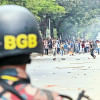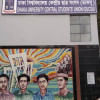A soul that lit the darkness

Today, July 16, marks the first death anniversary of Abu Sayed—the first martyr of the July uprising—who was once ordinary and overlooked, but rose to become the flagbearer in ending the reign of Awami League authoritarianism through his monumental sacrifice. He became an icon of fearless resistance, defiance, and selflessness, ushering in a new dawn for Bangladesh. His spirit left us a creed: to live not merely to breathe; to bow to no crimson glare of the tyrant; and never to retreat in the face of oppression when rights, truth, and justice demand a voice. And yet, beyond his place in history and the grandeur of public legacy, he was someone very close to my heart. To me, he was not merely a symbol of rebellion, but a living conscience—unyielding, immovable, and outspoken.
Although we were classmates, we recognised each other online, thanks to the suspension of in-person classes due to the Covid pandemic. The friend I kept encountering in every educational Facebook group was him—always showing resilience, determination, and commitment to his studies, with the hope of becoming the breadwinner for his family and working for the betterment of the underprivileged. That marked the beginning of our friendship, a spiritual bond that remained unbroken, even at the eleventh hour of his life. I still recall July 15, when he offered his umbrella to shield his friend from the rain and suggested we share a cup of tea. That simple act of kindness and generosity now lingers in my memory, haunting me with a quiet ache. If only I had accepted his offer, perhaps we could have shared one more moment, one more memory, over a warm sip of tea.
He was always the first person to ask how I was whenever I stepped into the classroom. No one else ever called just to go over the syllabus before an exam. It was Sayed, with his intellect and insight, who could always find a resolution, even in the most difficult topics. No one else showed such genuine grief and offered heartfelt condolences during my personal losses. It was Sayed who gave me the strength to carry on during my father's operation and our semester final examinations, encouraging me to stay strong when I needed it most. But now, there is no one left to encourage me with those familiar words: "You will do well in every exam." I no longer have someone to rely on for assignments, projects, and presentations, as we were always in the same group. He was the one who shared the burden, offering unwavering support that made our academic journey smoother and helped us overcome every challenge together.
Worse still, he is now thousands of miles away from us, living in a world beyond our reach. A world where our words cannot follow. Yet his memories remain ever-present. Sayed has transcended death by embracing it courageously, and he will remain etched in our memory and collective consciousness as long as Bangladesh lives.
As a student of the Department of English, he not only immersed himself in English literature but also embodied the noble character traits of significant literary figures, applying their morals in his own life.
He was like Hamlet from Shakespeare's Hamlet, having the mind of a philosopher without being an actual philosopher. As an intellectual, he thought more deeply and critically, constantly questioned the meaning of life and existence, and felt more intensely. He possessed a sense of appreciation for beauty—not physical beauty, but the inner beauty of human souls. His sense of idealism and moral sensibility made him vulnerable in the face of the vileness and ugliness of earthly gains, instigating him to brave death to remove inequality, injustice, spiritual barrenness, and ignite a flame to dispel the darkness.
His pursuit of knowledge prompted his relentless quest for understanding, wisdom, and truth. In most cases, society imposes certain standards that primarily benefit those in power. From an early age, we are taught to accept these norms without question. But he was capable of thinking independently and refused to shape his life around borrowed ideas. This ability to think critically set him apart from the mainstream, even though he came from modest means. Thus, he lived an authentic and examined life that gave him distinction.
Abu Sayed emerged as a true visionary, committed to building a nation free from corruption, discrimination, exploitation, ignorance, injustice, inequality, marginalisation, misrule, and unemployment. He was always vocal against the sinkhole of corruption, highlighting how lenient punishment emboldens it, and urging civic institutions to enforce transparency and accountability, holding perpetrators to account and dismantling corrupt networks. He championed anti-discriminatory efforts to eradicate deep-rooted bias and protect equal rights for all citizens, irrespective of caste, creed, or colour, in line with constitutional and international human rights standards. He raised his voice against exploitation and systemic oppression, demanding an inclusive nation that does not relegate anyone to the margins.
He held a deep admiration for education, believing it the path to genuine freedom through the elimination of unemployment. What he truly desired was a system where meritocracy triumphed over political favouritism. Time and again, he stressed the importance of women's empowerment through equal participation in education. He stood as an exemplary figure, underlining the urgency of girls' education by covering all educational expenses for his younger sister with his hard-earned tuition income.
He did not simply sympathise with the distressed, he empathised. He initiated several charitable organisations and actively participated in them with great devotion. He even dared to donate blood during exam periods, ignoring the physical strain. Having endured multiple layers of personal suffering throughout his life, he became more humane and deepened his desire to work for a better, more compassionate, and more just world.
Remarkably, what made him exceptional was his unwavering determination and firm resolution never to yield to injustice, standing on the edge between life and death, and finally he summoned death for a greater cause. He never bowed to injustice, nor did he compromise with wrongdoing. He delivered on his commitment until his final breath. He never tried to escape death. Instead, he embraced it willingly, as his death could ignite the conscience of a nation. It became more than a sacrifice. It became a call to action.
The way he embraced death raises a profound question: what truly gives life its meaning—its duration or its quality? His fearless confrontation with death compels us to reflect on the real value of life and human existence. His sacrifice reminds us that the search for meaning, the desire to build and endure, and the drive to uplift humanity are what truly give life its worth. His courageous acceptance of a tragic death at such a young age reflects the philosophical truth that all human beings are destined to die. Yet, it is heroic to embrace that fate unflinchingly when it serves a higher purpose. He reveals that true immortality does not lie in living forever, but in living with such meaning that your memory remains alive.
Do all his dreams remain unfulfilled? No. He is like the mythical Phoenix, sacrificing himself only to rise from the ashes as thousands more. He chose death not as an end, but as a means of awakening and empowering countless youths to protest, to proclaim, to resist, and to reclaim their rights from the monsters of oppression. Here, death is no longer an end, it becomes an opportunity to set ablaze all forms of injustice, suppression, and the historical silencing of voices. His courageous death marks the tipping point for Bangladesh to begin anew, echoing the dream of all those who gave their lives for an inclusive, non-communal nation—one built on equal footing, mutual respect, and peaceful coexistence.
Abu Sayed is like the sky, studded with stars, shining like Sirius—distant, yet radiant—his name now echoing in the hymn of our awakening. In every act of courage, in every stand against injustice, in every pursuit of truth, we carry a piece of him forward.
Sonia Benty Siddik, a Master's student of English Literature from Begum Rokeya University, was a friend of Abu Sayed.
Views expressed in this article are the author's own.
Follow The Daily Star Opinion on Facebook for the latest opinions, commentaries, and analyses by experts and professionals. To contribute your article or letter to The Daily Star Opinion, see our submission guidelines.

 For all latest news, follow The Daily Star's Google News channel.
For all latest news, follow The Daily Star's Google News channel. 










Comments